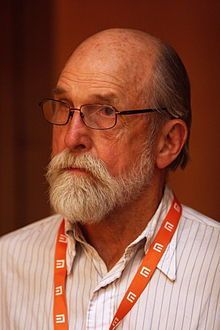
Les Blank, the documentary filmmaker known for his brief, exquisite works on people and cultures on the periphery of the American mainstream, died of bladder cancer on Sunday at age 77.
Born on Nov. 27, 1935 in Tampa, Fla, his interest in becoming a filmmaker was said to have been sparked by the Ingmar Bergman film "The Seventh Seal." He studied acting and playwriting at Tulane and attended film school at the University of Southern California.
Many of his early films focused on jazz and blues musicians, including "Dizzie Gillespie" (1965) and "The Blues Accordin' to Lightnin' Hopkins," the 1969 film which first won him acclaim. Other music-related works took Tex-Mex norteño music, Appalachian fiddler Tommy Jarrell and zydeco performer Clifton Chenier as their subjects. But his two best-known documentaries chronicle the strange pursuits of Werner Herzog, the German filmmaker known for his celebrations of "conquests of the useless." Blank's "Burden of Dreams" (1982) followed Herzog and his crew into the Amazon during the filming of "Fitzcarraldo," which production required a ship to be hauled over a jungle mountain, and featured Herzog's memorable musings on the jungle. ("The trees are in misery, and the birds are in misery. I don't think they sing; they just screech in pain.")
Another film on Herzog, 1979's "Werner Herzog Eats His Shoe," showed Herzog doing just that, the result of a lost bet made to encourage his friend Errol Morris to complete work on his first documentary. Herzog's leather boots were boiled in duck fat, stuffed with garlic and consumed at a restaurant in Berkeley.
Other Blank films dealt with food, albeit in a different manner. "Garlic Is As Good as 10 Mothers" (1980) extolled the vegetable, with the director recommending that several heads of it be placed over a toaster in the back of the theater while the movie was screened so as to allow its smell to slowly permeate the space. "All In This Tea" (2007) followed an American high-end tea importer during his visits to China. Both the latter film and "Burden of Dreams" were applauded for what was seen in some quarters as an environmental consciousness -- in "All In This Tea," the importer defended the anti-pesticide, quality-over-quantity tastes of his high-end customers, while "Burden of Dreams" depicted Herzog's ravaging of the jungle landscape during preparations to haul the ship over the mountain.
Among other filmic essays was the 1987 "Gap-Toothed Women," a series of interviews on the subject inspired by the memory of an old high school crush.
In an interview with the New York Times, director Taylor Hackford called him "a national treasure."
"Although his films are not well known at the moment, they'll take their place," Hackford said. "Films are great when they live a long time, and I think Les's will live."
He is survived by two sons, a daughter, and three grandchildren.
© 2025 Latin Times. All rights reserved. Do not reproduce without permission.



